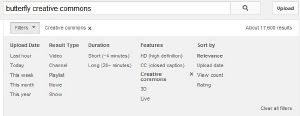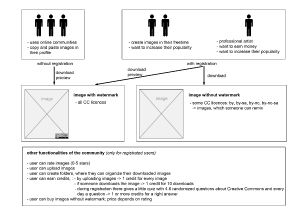| Line 30: | Line 30: | ||
* people don't want to search long after the license information | * people don't want to search long after the license information | ||
* they want a plain overview of the licences | * they want a plain overview of the licences | ||
* if they remix contents, they want to be sure of using the licenses the right way | * if they remix contents, they want to be sure of using the licenses in the right way | ||
===We identified the following important activities=== | ===We identified the following important activities=== | ||
Revision as of 19:51, 26 May 2013
User Research
Research we did
- we were looking for arguments for and against Creative Commons on the internet
- we conducted some interviews
- we asked some pre-formulated questions and also some other during the interview
- pre-formulated questions were:
- Do you know Creative Commons? If yes, from where do you know it? In which way do you use it or why do you not use it?
- How do you license your works?
- persons, who we have interviewed face-to-face:
- computer science student with facebook-account
- computer science and media student with facebook- and deviantart-account; she paints in her free time and publishes some scientific results to her university website; she corrected grammar and orthography in wikipedia articles
- media student with facebook-account; he also works as a dj
- business student with a facebook-account; she photographs in her free time
- web designer
- we recorded the interviews and made to ourselves a few written notes
Problems we identified
- some people have never heard Creative Commons or they knew little about it
- anti Gema movement, wikipedia
- people didn't use Creative Commons or they unconsciously use it
- example: Somebody writes an article or something else in wikipedia, but don't recognize that wikipedia stands under Creative Commons license.
- people didn't know something of Creative Commons filter, which can be used for searching with google, youtube, ...
- people saved images on the computer, but after a while they forgot the place, where the image was downloaded
- they don't save any extra information (license, author, ...)
We identified the following motivations and goals of users
- people don't want to search long after the license information
- they want a plain overview of the licences
- if they remix contents, they want to be sure of using the licenses in the right way
We identified the following important activities
- people look for content to a central place
- for pictures: google, deviantart
- for scientific papers: google
- for source code: google, sprut - site with source code to programming a compiler (German website)
- first they create their work and afterwards they look after the license
- the most community user copy and paste images to their profile without looking for license
- people share their own works under the German copyright
Our Ideas
1. TRADING PLACE FOR IMAGES
What is the essence of this solution?
brief explanation
The trading place for images should help that less people copy and paste images without looking for license of them and the registered users can trade some special images among themselves. Also they can rate and organize the uploaded images.
more details...
- problem of this solution: users do not want to pay credits for pictures without watermark, if they can download it without watermark elsewhere (e.g. flickr)
Why are current solutions unable to support users in this?
2. IMAGE MANAGEMENT PROGRAM
This is our preferred idea in the moment. -- Elisabeth 17:41, 26 May 2013 (CEST)
What is the essence of this solution?
brief explanation
User can search pictures with CC license (flickr, google, ...) with the program and they can also structure and save them. Additional information (license, author, source, ...) of the image is stored locally on the computer and the user can decide to copy and paste an image with or without watermark.
more details...

